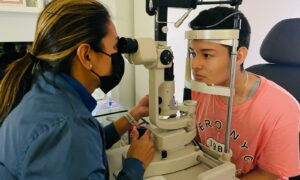October 1, 2020
By Dwight Akerman, OD, MBA, FAAO, FBCLA
 In recent years, it has been argued that computers, smartphones and tablets play a role in myopia development, and thus this is a current issue. Several studies have examined the individual relationship of digital screen time as a risk factor for myopia. However, consistent evidence of an association between screen time and myopia development is lacking.
In recent years, it has been argued that computers, smartphones and tablets play a role in myopia development, and thus this is a current issue. Several studies have examined the individual relationship of digital screen time as a risk factor for myopia. However, consistent evidence of an association between screen time and myopia development is lacking.
Although myopia prevalence increased before the massive use of digital devices in some countries, with the rise being influenced by education, there may be an added recent effect of screen time. The aim of this systematic review is to determine the association between screen time and the risk of developing (1) prevalent or incident myopia, or (2) the risk of myopia progression in children.
This review shows no clear association between screen time and myopia prevalence, incidence or myopia progression. Only seven out of 15 studies found an association between screen time and myopia. As the results are mixed, further studies are warranted. This is one of the first systematic reviews to comprehensively summarize existing data on screen time in children and myopia.
Abstract
The Association Between Digital Screen Time and Myopia: A Systematic Review
Purpose: Digital screen time has been cited as a potential modifiable environmental risk factor that can increase myopia risk. However, associations between screen time and myopia have not been consistently reported. Although myopia prevalence increased before the massive use of digital devices in some countries, with the rise being influenced by education, there may be an added recent effect of screen time. The aim of this systematic review is to determine the association between screen time and the risk of developing (1) prevalent or incident myopia, or (2) the risk of myopia progression in children. Published manuscripts were identified in PubMed, ScienceDirect and the Cochrane Library, and citation lists were reviewed.
Recent findings: Fifteen studies were included (nine cross‐sectional and six cohort studies), with a total of 49,789 children aged between 3 and 19 years old. Seven studies found an association between screen time and myopia. The results showed mixed evidence with the more recent studies exposing a trend of association between hours spent by children using screens and myopia. Meta‐analysis using a random‐effects model was performed in five studies (n = 20,889) that reported odds ratio (OR). The I2 statistic was used to assess heterogeneity. A pooled OR of 1.02 (95 percent CI: 0.96–1.08; p = 0.48) suggests that screen time is not associated with prevalent and incident myopia in this group of five studies.
Summary: The results for screen time and myopia are mixed. Further studies with objective screen time measurements are necessary to assess evidence of an association between screen time and myopia.
DOI: https://doi.org/10.1111/opo.12657 https://onlinelibrary.wiley.com/doi/full/10.1111/opo.12657











